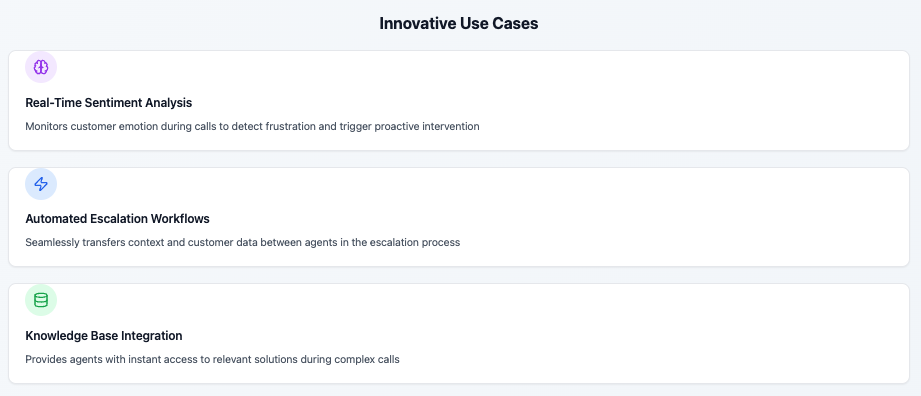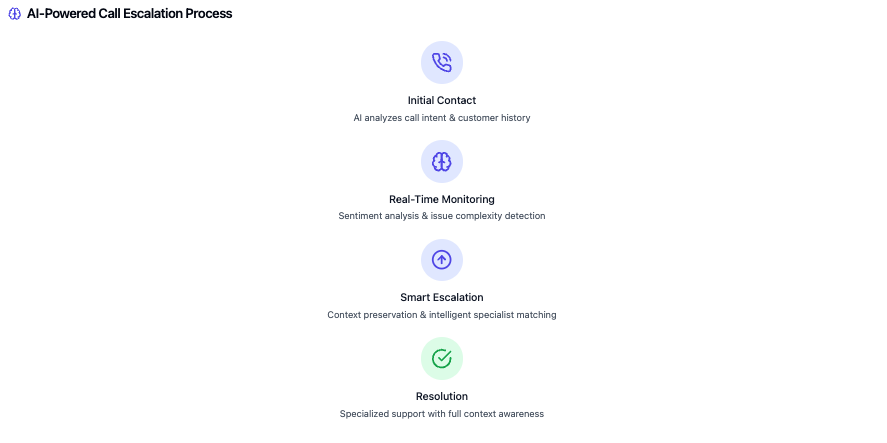Live Call Escalation Made Seamless with AI Technology
Live Call Escalation Made Seamless with AI Technology: The Future of Customer Service
In today’s customer obsessed business world, how companies handle call escalation can make or break their reputation. When a customer’s issue needs to be bumped to a higher level of support, the process needs to be seamless, efficient and effective. That’s where advancements in call center technology, particularly the integration of AI, are causing a revolution in contact centres.
Introduction to AI in Call Centers
The integration of Artificial Intelligence (AI) in call centers has revolutionized the way businesses handle customer interactions. AI-powered call centers have transformed the traditional model of customer service, enabling companies to provide faster, more efficient, and personalized support to their customers. By leveraging AI technologies such as Natural Language Processing (NLP), Machine Learning (ML), and predictive analytics, businesses can automate routine tasks, improve response times, and enhance customer satisfaction.

AI systems can handle a wide range of customer inquiries, from simple questions to complex issues, with remarkable accuracy and speed. This not only frees up human agents to focus on more intricate problems but also ensures that customers receive timely and relevant assistance. The result is a significant boost in customer satisfaction, as customers no longer have to endure long wait times or repetitive explanations.
Moreover, AI’s ability to analyze vast amounts of data in real-time allows call centers to gain valuable insights into customer behavior and preferences. This data-driven approach enables businesses to tailor their services to meet individual customer needs, further enhancing the overall customer experience. In essence, AI is not just a tool for improving operational efficiency; it is a catalyst for transforming customer service operations into a more responsive and customer-centric model.
Call Escalation Evolution
Traditional call center escalation has been plagued with inefficiencies: customers having to repeat info multiple times, long wait times and frustration on both sides of the conversation. Enter AI powered solutions and these pain points are now opportunities for exceptional service delivery.

The Evolution of Traditional Call Centers
Traditional call centers have undergone significant changes with the advent of AI technology. The traditional model of customer service, where human agents handle all customer interactions, has been transformed by the integration of AI-powered solutions. AI call centers have emerged as a more efficient and effective way to handle customer inquiries, providing 24/7 support and reducing operational costs. The evolution of traditional call centers has been driven by the need to improve customer satisfaction, reduce wait times, and increase operational efficiency.
In the past, call centers were often associated with long wait times, repetitive questioning, and inconsistent service quality. Human agents, while essential, could only handle a limited number of calls at a time, leading to bottlenecks and customer frustration. However, with the introduction of AI, these challenges are being addressed head-on. AI systems can manage multiple customer interactions simultaneously, ensuring that inquiries are handled promptly and accurately.
Furthermore, AI’s ability to learn and adapt over time means that it can continuously improve its performance, leading to better service quality and higher customer satisfaction. By analyzing customer interactions and feedback, AI can identify common pain points and suggest improvements, enabling call centers to refine their processes and deliver a superior customer experience. This shift from traditional call centers to AI-powered operations represents a significant leap forward in the quest for operational efficiency and customer-centric service.
Key Components of AI in Call Centers
AI-powered call centers rely on several key components to deliver efficient and effective customer service. These components include:
Natural Language Processing (NLP)
Natural Language Processing (NLP) is a critical component of AI-powered call centers, enabling computers to understand and interpret human language. NLP allows AI-powered chatbots and virtual assistants to communicate with customers in a natural and human-like way, providing personalized responses to customer inquiries. By understanding the nuances of human language, NLP can accurately interpret customer questions and provide relevant answers, reducing the need for human intervention.
NLP also plays a crucial role in sentiment analysis, allowing AI systems to gauge customer emotions and adjust their responses accordingly. This capability ensures that customers feel heard and understood, leading to higher levels of customer satisfaction. In essence, NLP bridges the gap between human communication and machine understanding, making AI-powered call centers more responsive and empathetic.

Machine Learning and AI Algorithms
Machine Learning (ML) is a type of AI that enables computers to learn from past experiences and make better decisions over time. ML algorithms are used in AI-powered call centers to analyze customer data, predict customer behavior, and improve service quality. By leveraging historical data, ML can identify patterns and trends, allowing call centers to anticipate customer needs and proactively address potential issues.
AI algorithms are also used to automate routine tasks, such as call routing and information retrieval, which significantly improves response times and operational efficiency. By handling these tasks automatically, AI frees up human agents to focus on more complex and high-value interactions, enhancing the overall customer experience. The continuous learning capability of ML ensures that AI systems become more accurate and effective over time, leading to sustained improvements in service quality and customer satisfaction.
By leveraging these key components, AI-powered call centers can provide faster, more efficient, and personalized support to customers, leading to improved customer satisfaction and operational efficiency. The integration of NLP and ML not only enhances the capabilities of AI systems but also ensures that they can adapt to the ever-evolving landscape of customer service, making them indispensable tools for modern call centers.
AI Powered Call Escalation Benefits
First Contact Resolution
One of the biggest benefits of AI in call escalation is intelligent call routing, which matches callers with the right agents from the start. By analysing the nature of the inquiry and customer history, AI systems can route calls to agents with the specific expertise needed, increasing the likelihood of issues being resolved without escalation at all.
Real Time Monitoring and Intervention
AI gives supervisors unprecedented visibility into live customer interactions by analyzing customer sentiment. Through real time monitoring, team leaders can identify potential issue calls before they escalate and help out agents in real time. This proactive approach prevents many escalations before they become necessary.
Customer Satisfaction
When escalations do happen, AI makes them happen smoothly. By preserving context between agent transfers and connecting customers with specialists who have the right expertise, the customer experience is much better. Companies that have implemented AI driven escalation processes are seeing big increases in customer satisfaction metrics.
Operational Efficiency
The numbers don’t lie: companies using AI for call escalation management are seeing up to 40% faster call handling times. This is due to streamlined processes, reduced info repetition and more accurate routing of complex issues to the right specialist from the start.
Data Driven Strategic Insights
Beyond the operational benefits, AI provides valuable insights into escalation patterns, common triggers and agent performance. These insights allow contact centre leaders to make data driven decisions, fix systemic issues and foster continuous improvement in their escalation processes.
Innovative Use Cases for Contact Centres
Intelligent Routing
AI goes beyond basic IVR by utilizing an AI system to understand the nuances and complexity of customer inquiries. By analyzing the specific nature of each call, the AI system can match it with agents who have the exact expertise required, reducing unnecessary escalations.
Real Time Sentiment Analysis with Natural Language Processing
Performance Through Real Time Feedback
AI tools can give agents real-time suggestions and customer feedback during calls, helping them navigate complex issues better. By guiding agents through tough conversations, these systems reduce escalations and first call resolution.
Automated Escalation Workflows
When escalations do happen, AI can automate key parts of the process, ensuring the right info flows seamlessly between agents and departments. This reduces errors, customer frustration and overall efficiency in the escalation journey.
Personalised Support Solutions
AI analysis of customer behaviour and previous interactions allows for highly personalised customer experiences. By understanding the customer’s history, preferences and pain points, agents can provide solutions that often prevent escalation altogether.
Knowledge Base Integration
Powerful AI tools can scan vast knowledge bases in real time during calls, suggest relevant articles and solutions to agents. This empowers frontline agents to handle increasingly complex issues that would otherwise require escalation, increasing resolution rates at first point of contact.
The Future of Call Escalation
As AI evolves we’ll see even more sophisticated approaches to call escalation. Predictive analytics will identify potential escalation scenarios before they happen, allowing for proactive intervention. Natural language processing will improve, allowing for better understanding of customer needs and emotions.
The best companies are already adopting these technologies, recognising that call escalation management is not just about problem resolution – it’s about turning potentially negative experiences into opportunities to build stronger customer relationships. However, it is essential to transition to a human agent when necessary, ensuring that customer interactions remain solution-focused and emotionally resonant.
By using AI powered escalation processes businesses can improve customer satisfaction, operational efficiency and agent experience – a winning combination that puts them ahead in the competitive service landscape.
The question isn’t should you implement AI in your call escalation process – it’s how fast can you do it to stay ahead of rising customer expectations and competitive pressures.
